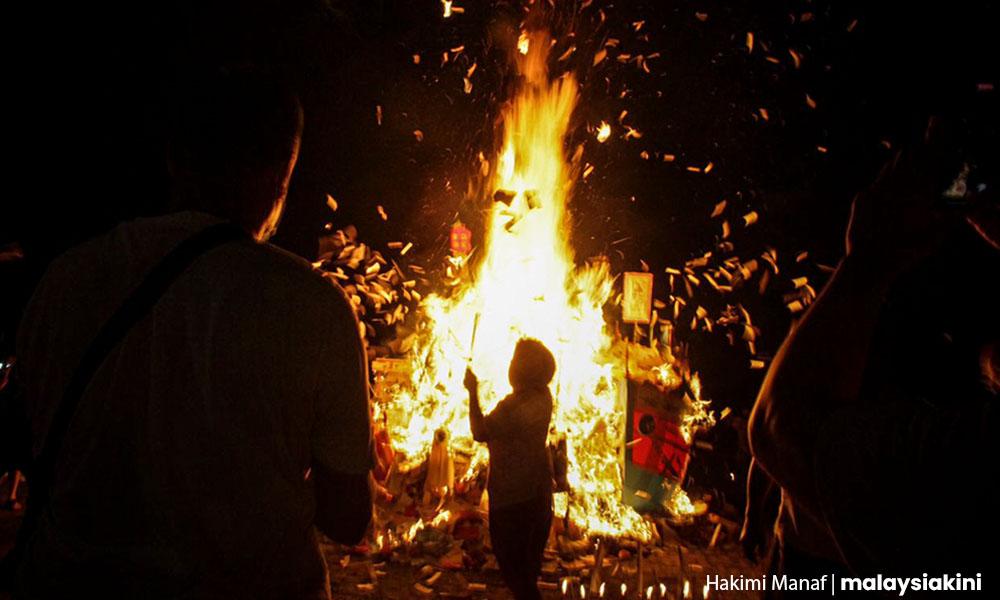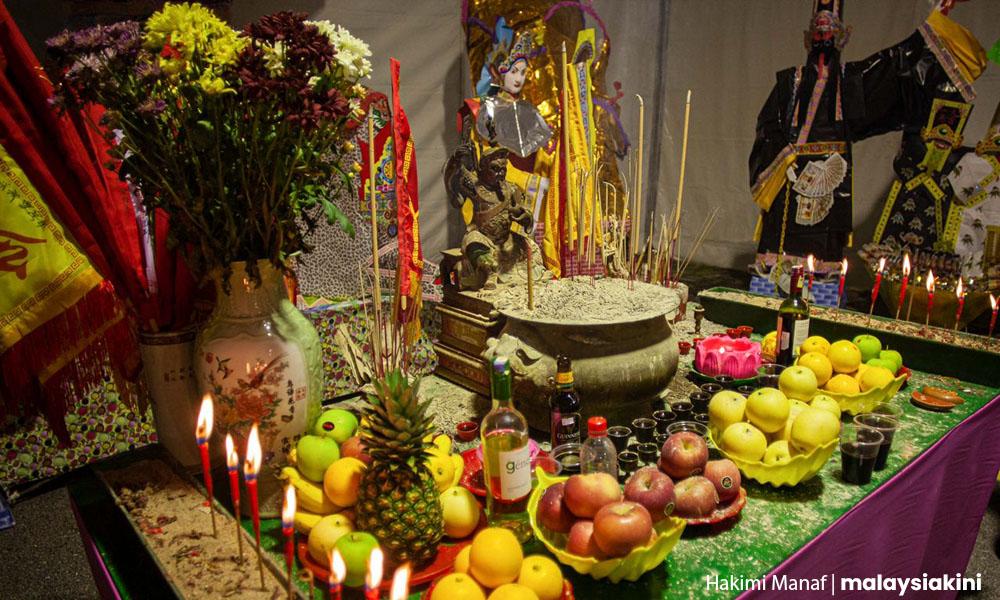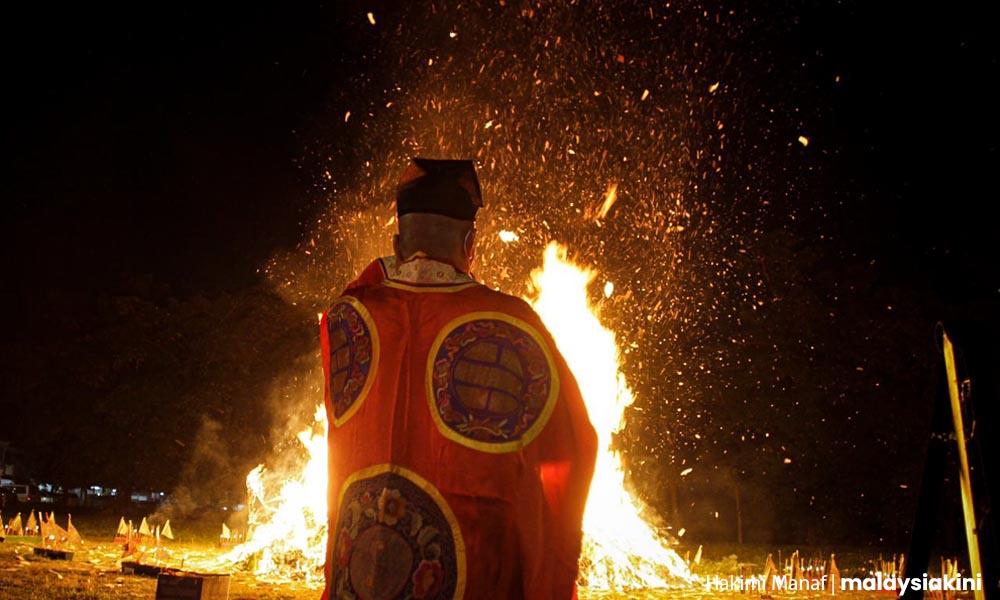In a country where it feels as though every school and hospital has claimed some link to the supernatural, the Hungry Ghost Festival, at first glance, appears to be embedded in the fabric of Malaysian superstition.
Held between July 29 and Aug 26 this year, the month-long Hungry Ghost Festival - also known as the Zhongyuan Festival - is a cultural festival observed by many Malaysian Chinese.
But as much as it is often talked about, are the wandering ghosts truly the main thread that holds the festival together?
Academic Jason Ng Sze Chieh begged to differ on the matter.
Ng, when contacted by Malaysiakini, explained that the main belief held by many in the Chinese community is that spirits roam the streets during this festival month and can be felt by those spiritually sensitive.
Further, he said, the term ‘ghost’ in the festival’s name is translated from the Chinese word "鬼" (gui).
The word is said to carry a negative connotation in Chinese as it implies these ‘spiritual beings’ are malign and out to cause harm to the living.

“The ghosts in this festival actually refer to the spirits or souls of the deceased who had been imprisoned in hell (underworld) as punishment for their sins.
“Since the king of hell (阎罗王) allows these prisoners to briefly return during this annual event, these are less akin to evil ghosts but are more like tortured spirits seeking solace in revisiting their families.
“Hence, the Hungry Ghost Festival is actually a misnomer and a translation of the Chinese common parlance of 饿鬼节 (E Gui Jie),” Ng said.
Jie - short for Jie Ri (节日) - is an important date in the Chinese calendar, which is not necessarily a "festival" as understood in English.
He added that the spirits believed to be freed during this time have suffered for a year.
“These ghosts have suffered for a full year, being tortured and deprived of food in hell for their various sins when they were alive.
“During this month-long reprieve, the living relatives will prepare food to ‘serve’ the returning ghosts so that they might ‘eat’ their fill before returning to hell,” Ng said.
At this time of the year, streets across the nation can be seen adorned with food, joss sticks and paper objects for the festival.
The festival’s climax takes place on the 15th night of the seventh lunar month in the Chinese calendar - which will be celebrated tonight (Aug 12).
According to Ng, the burning of joss sticks, paper money and paper objects - which includes objects like houses, cars and appliances - is more important than food offerings for this month.
This is because the wandering ghosts may be in greater need of these items in the underworld.

“In terms of taboo, avoid offering things that are too reddish in colour.
“Red is for auspicious events and is deemed an unsuitable colour for solemn festivals such as the Hungry Ghost Festival. Pink items are acceptable though,” he advised.
Other taboo beliefs associated with the month include:
Avoid going out late at night for fear of accidentally inviting maligned ghosts to return home with you.
Avoid hanging laundry outdoors overnight to prevent the ghosts from wearing your clothes.
Try not to call out the ‘real’ names of your loved ones after dark to prevent ghosts from pretending to be you.
Avoid the consumption of food laid out on the altars for prayers otherwise, you would be "stealing" food meant for the ghosts.
Moving homes, buying new vehicles and getting married are also discouraged throughout this period.
It is also advised that drugs and alcohol are avoided as some believe that it is easier for ghosts to possess those who are intoxicated.
Keeping traditions alive
On a global scale, there is a high chance that one will be able to witness the festival in full swing wherever the Chinese community flourishes.
Neighbouring countries that are also known for their vibrant celebrations of the festival include Indonesia, Singapore, Taiwan and Australia.
It is unclear when exactly the festival was first celebrated in the nation. Despite this, Ng claimed that the festival has been celebrated in Malaysia ever since the Chinese first settled in the peninsula.
It is said that all dialect groups celebrate the festival - albeit, with slightly varying practices, modes or rituals.
Notably, however, those within the Chinese community who are of the Christian faith do not celebrate the month.
The Hungry Ghost Festival does not rank highly - in relation to other festivals such as the Qing Ming Festival (Tomb-Sweeping Day) and Chinese New Year - as it is tied closely to traditions and the Buddhist and Taoist faith in certain Chinese communities.

“In areas where Chinese cultural traditions are alive and strong, the Hungry Ghost Festival is a big deal.
“Certain modern Chinese families who are not too traditionally inclined may not even do much ritually but may only follow the taboos.
“Generally, Chinese New Year is most important, but Qing Ming and Mid-Autumn are equally important as the former is for remembrance while the latter is for a reunion,” Ng explained.
He added that celebrations like the Dragon Boat Festival - which are seen as being more “cultural” than “traditional” - are also considered of relative importance.
Asked if the younger generations within the local Chinese community are aware of the festival’s customs, Ng replied in the affirmative: “The younger generation is aware. But not all are keen to keep it alive as modernity and the pursuit of a better life caused the young to decide to discard these ‘old’ customs.
“It is up to the family to educate the young to respect and continue the traditions,” he said.
However, this begs the question of what a future, markedly without the Hungry Ghost Festival, could look like.
Malaysiakini posed the question - what would happen in Taoist tradition if the ‘lost spirits’ are not fed? - to Ng.
“They will just be ‘hungry’ and will be forced to return to hell when the gates are about to close,” he concluded. - Mkini




No comments:
Post a Comment
Note: Only a member of this blog may post a comment.